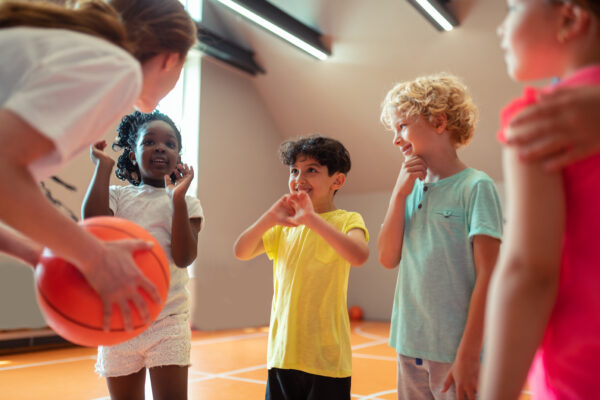As a parent, you want your child to meet their social goals, connect with their peers, make friends and be included in social activities.
Research shows that children with hearing loss can be at risk of delayed social skill development needed to fit in at school and beyond, compared to their hearing peers.12
“Because of their hearing loss, they grow up in a ‘hearing bubble’ where it is difficult to easily participate in conversation with friends and family when in a noisy situation,” says Dr. Anne Fulcher (PhD), an Australian listening and spoken language expert.
It’s tempting to use overly simplistic language, rather than exposing your child to rich conversational language. Or to limit your child’s exposure to group settings with hearing peers.
But a lack of exposure to everyday social situations means they can miss out on cues learned through body language, tone of voice and group play.
Here are some tips to help build a child’s social skills:
1. Expand your child’s social circle
Don’t limit your child to activities with other children with hearing loss or to quiet environments. It’s important to help them interact and learn from all children.
Give your child opportunities to interact with people of all ages and in a range of environments to learn body language.
“As well as those nice quiet learning environments, they need to be exposed to their peers if they’re going to be successful integrators. One strategy to assist would be to place them in situations where they work with small groups of hearing children to solve problems, for example, when playing tactical board games,” says Dr. Fulcher.
2. Talk about everyday social interactions
Talk about how body language and tone of voice conveys how we feel. This helps children understand that there are multiple aspects to how we listen and express ourselves. It also prepares them for group settings.
“Teach them certain things to look out for, like when it’s OK to interrupt when someone is speaking, or how to take turns and share.”
Use role play and find opportunities to ask your child to interpret and copy facial expressions to help them understand body language and facial cues. You can label emotions and body language: “Look at Jane. She looks sad. I wonder what’s making her sad?”
3. Don’t treat a child with hearing loss differently
Avoid using simplistic language or speaking in single words. Throughout the day, talk with your child about what’s happening: how you are making decisions and offering choices.
“Talk to them as much as you can. Bathe them in lovely, embellished language,” Said Dr. Fulcher.
4. It’s never too early or too late to start
Social skills develop from a very young age, so it’s never too early to start these strategies. Singing together, taking turns, and imitating actions and sounds all help tune in to each other and having a conversation.
Equally, it’s never too late to help an older child or young adult if they miss certain social cues.
Click here to get more rehabilitation resources.
- Hoffman, M.F., Quittner, A.L., and Cejas, I., 2015. Comparisons of social competence in young children with and without hearing loss: a dynamic systems framework. Journal of deaf studies & deaf education, 20 (2), 115–124. doi:10. 1093/deafed/enu040.
- Laugen NJ, Jacobsen KH, Rieffe C, Wichstrøm L. Social skills in preschool children with unilateral and mild bilateral hearing loss. Deafness & Education International. 2017 Apr 3;19(2):54-62.

